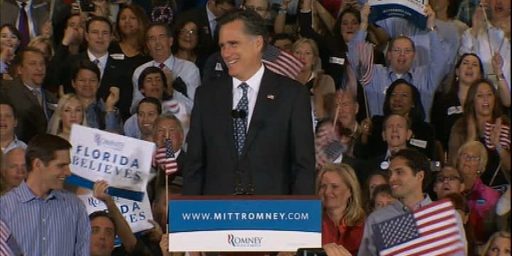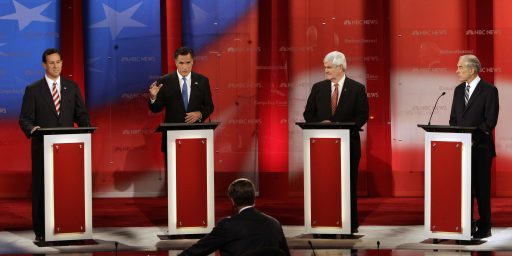Zakaria on Gingrich and Oil Prices
Via CNN, Fareed Zakaria:
Look, the world consumes about 80 million barrels of oil a day. The total U.S. increase in production, if you were to do everything that Newt Gingrich fantasizes about, would be less than half a percent of that. So the chance that it would have any impact on the price of oil, particularly in the short run, is pure fantasy. Newt surely knows better.
The truth of the matter is that we are in the middle of a great boom in domestic oil production. We are at the highest levels in 30 years. The United States for the first time is actually exporting oil rather than importing oil, and it has made no difference to our prices. In fact, as we can see, oil prices have gone up. Why? Because, (A) China is growing, India is growing, etc. and (B) people are worried about a possible war with Iran – geopolitical concerns. So these are not things that you can easily fix. You’re not going to get China to slow down. You are not going to change the fact that there are genuine concerns about Iran. Increasing American domestic production is such a marginal issue at this point that it’s really totally irresponsible for Newt Gingrich to be saying this.
Indeed. In fact, indeed3.
Another key point:
In point of fact, whether or not the president is enthusiastic about it or whether what’s happening is over his grudging objections, the truth of the matter is, we are in the midst of a huge oil boom and still prices are rising.
This is really rather significant: the entire argument about increasing domestic oil production is that it will allegedly bring down price. However, we have increased domestic production and yet price is rising. This is why just drilling is not the answer people like Gingrich make it out to be.
Also:
Keystone is a total red herring because, of course, the Keystone oil is going to be excavated, it is going to be produced, it is going to be used. It is going to be used by China or us. It makes not a jot of difference to the price of oil because that oil will reach the world market.
And I will conclude that, like Zakaria, I have no problem with increasing domestic production as a general proposition. However, I also have to accept the reality of the dynamic at work here (something Gingrich and, it would seem, the other GOP candidates are refusing to do).






We have more oil than Saudi Arabia? Wtf? I love Hayes mispoken “The Reagan”.
I am stupid. I don’t know why I was writing Hayes instead of Moore. Second look at St. Patricks Day drinking?
It seems to be a feature of modern conservatives that they are incapable of adjusting to reality. Put differently, they prefer articles of faith to reality. I imagine it’s part and parcel of religion. Faith trumps evidence, and that preference, what I would consider a mental deficiency or handicap, drives their politics. There are certainly individuals who manage to be both religious and rational, but those folks are not typically in the fundamentalist, evangelical and ecstatic segments of religion.
Of course Newt knows better, he’s not Santorum, after all. But he knows his base.
This isn’t actually true. We’re a net importer of oil. We’re a net exporter of gasoline.
A few points are worth mentioning:
1. Over the past four years oil prices have gone from $160 per barrel down to $35 per barrel and then back up again to over $100 per barrel. Did the Middle East disappear and then reappear during that time frame? Did Iran first turn into Switzerland and then into Nazi Germany during that time frame? Did China and India disappear and reappear?
Look, I know it’s de rigueur on the net to repeat the talking points that oil prices (and gas prices too) are elevated because of sabre rattling with Iran and because of China and India but that’s not actually the case. It’s a lazy and agenda-driven analysis that’s at least in large part dissociated from reality, but which now has been repeated so often, in so many contexts, it’s become an irrevocable meme.
Oil prices on the futures markets have been spiking over the past three years mostly because of the astonishingly-loose policies of the U.S. Federal Reserve and in more recent months similar policies by the Fed’s cousins over at the European Central Bank. Loose money has stoked massive commodities-based inflation across the globe and across the whole spectrum of commodity assets, from oil, to copper, to soybeans, to corn, to zinc, to gold and silver, and everything in between.
Iran is a small factor, not an element, and already was priced in as far back as 2005-2006. China and India are factors, not elements.
2. It’s correct to say that drilling for more oil alone won’t have a material impact on oil prices, especially in the short run, but that’s like saying that exercising more often won’t do anything but slightly increase your life expectancy. Do you see the point?
The more oil we produce domestically the less oil we need to import. Even if the import/export price ratio were identical it still would make sense to be using our own oil as opposed to imported oil. The Middle East is not the sort of place on which you want to be reliant.
What about the jobs issue? Let’s go ahead and assume arguendo that increasing domestic oil production barely will affect the price of oil. Shouldn’t we still pursue it? Would we rather have more Americans employed in high-paying jobs or more Saudis employed in high-paying jobs?
3. To say the Keystone Pipeline is a “red herring” on the oil price front itself is a red herring. The real issue with the Keystone Pipeline — not the left-wing media meme — is one of employment. Again, do we want a lot of American pipeline, terminal, railroad, trucking and engineering folks employed in high-paying jobs to bring Canadian oil to U.S. gasoline markets, or do we want a lot of Canadians employed in high-paying jobs to export Canadian oil to China and India?
4. Lastly, it’s absolutely correct to say that increasing domestic oil production would not itself be a panacea for elevated oil prices. All the more reason to increase said production and simultaneously to increase domestic shale production, domestic natural gas production and domestic nuclear energy too, and most importantly to increase domestic gasoline refining capacity by constructing more domestic refineries. Do you think that’ll ever happen, however, with the likes of Pelosi, Reid, Hoyer and Durbin holding so much power in Congress?
@Tsar Nicholas II:
To paraphrase …
Over the past four years oil prices have gone from $160 per barrel down to $35 per barrel and then back up again to over $100 per barrel. Did the U.S. Federal Reserve disappear and then reappear during that time frame? Did interest rates change in any significant way?
On your last paragraph, sure you can argue “pull all levers” but when we export gasoline that already means there is a market at this price.
If you owned a brand spanking new refinery, and you could export at this price, would you ask for less?
He does. He also knows that if you repeat something often enough on Fox, the 27% will accept it as if it came from a burning bush.
@Tsar Nicholas II: Once again the number 1 export of the USA right now is Fuel refined from OIL. So even if we were producing more domestic oil that only means we’d export even more oil then we already do. Your talking points are old and stale.
Unfortunately it seems TSAR is a drive by poster who drops off his talking points and then leaves to find another post to say the same thing..
The problem with a lot of the leaders who want an end to use of oil is that they are not giving us working class people any realistic alternative (Salazer, are you listening or are you watching the basketball games in your private jet or limo?). I drive a 4 cyl. Toyota that is 10 years old. I cannot afford to buy a new electric car, I live out in the suburbs away from any transit, and I can’t ride a bike or walk to work. Moped? Not my style. Solar, wind? Ok maybe for residential, but that can’t be hooked up to a car. Hydrogen? Sounds promising and could be just a couple of years away. The other side of this is the effect it has had on prices of food: up 40-50% in just one year: gallon of milk-now almost $4, bag of Doritos – now $3.88, two liter soft drink $1.50, Big Mac now over $3!
Here is an idea: let taxpayers deduct the entire price of a new electric car – a certain percentage per year. NO taxes on the car or on any electricity it takes to charge. Car dealers could really get a boost by offering free battery replacement as long as you own the car (some are already doing that). The politicians don’t care about the common, working class people.
It’s correct to say that drilling for more oil alone won’t have a material impact on oil prices, especially in the short run, but that’s like saying that exercising more often won’t do anything but slightly increase your life expectancy. Do you see the point?
Strawman. Newt’s argument is he can get gas down to $2.50. Not that he can eventually have a marginal impact that might be barely noticeable in a couple decades or so.
Let’s go ahead and assume arguendo that increasing domestic oil production barely will affect the price of oil. Shouldn’t we still pursue it?
We are. As has been repeatedly pointed out, we are at a 30-year production peak. When do you stop pretending otherwise?
To say the Keystone Pipeline is a “red herring” on the oil price front itself is a red herring.
Again, the discussion is about politicians’ claims they can dramatically reduce gasoline prices. You can try to change the subject, as you have, but the pipeline is most certainly a red herring in the discussion of lowering gas prices now.
The real issue with the Keystone Pipeline — not the left-wing media meme — is one of employment.
Keystone will very likely still be built, after the new route through Nebraska is determined. Of course Congress served to slow the entire process down by demanding an early decision before Nebraska could sort it out. Why aren’t you criticizing them for ensuring jobs will materialize later than they could have?